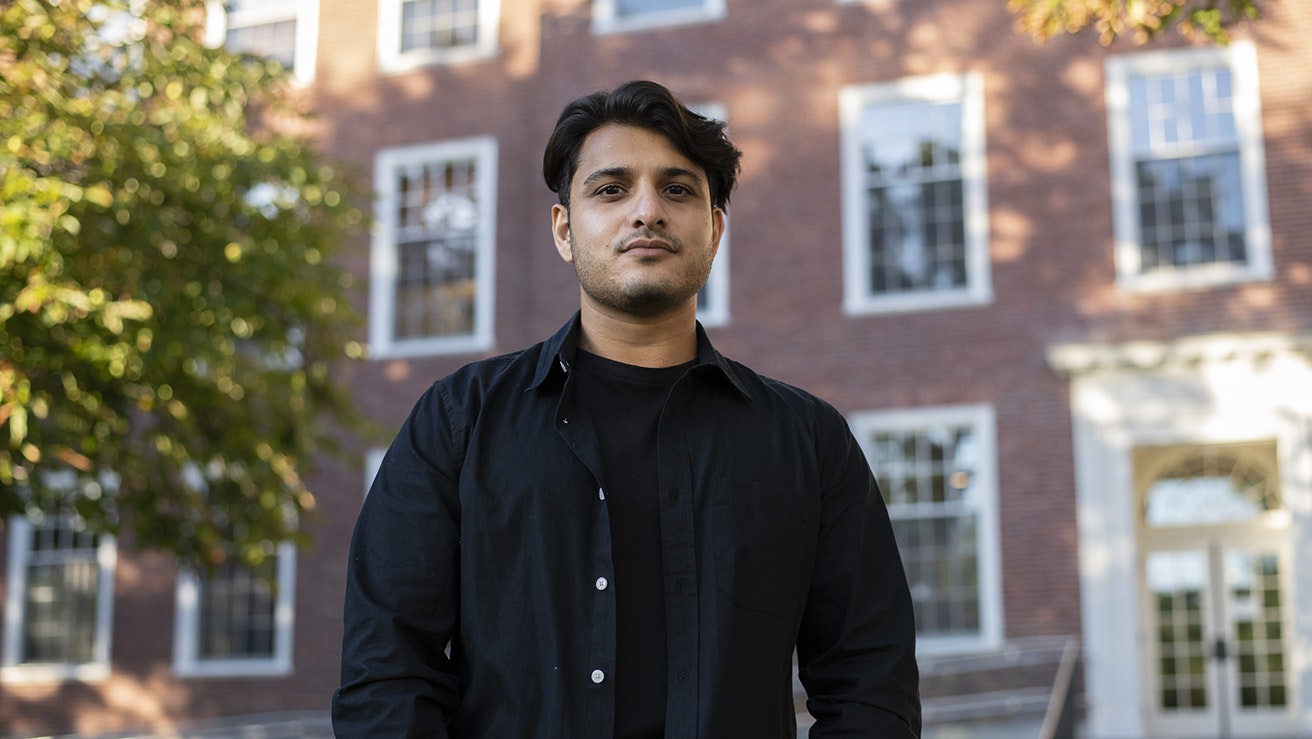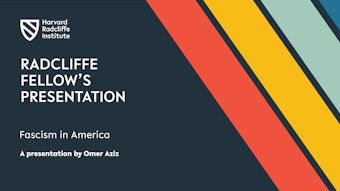No Longer an Outsider

In Brown Boy, the author Omer Aziz tells his story—and, in the process, forces us to reflect on what it means to belong in America.
Growing up in the working-class Toronto neighborhood of Scarborough, Omer Aziz was an apathetic, academically underperforming child of Pakistani immigrants—until a chance media encounter set him on an entirely different course.
Watching television with his grandmother, he saw the then-senator and presidential hopeful Barack Obama speak. It changed the course of his life. Aziz, then a rudderless senior in high school, saw in that brown face and Muslim-sounding name the possibilities beyond his entropic here-and-now. He began to turn his grades around and the next year enrolled at Queen’s University in Ontario, Canada. He would go on to earn a master’s in international relations at the University of Cambridge, graduate from Yale Law School, and serve on the cabinet of Canada’s Prime Minister Justin Trudeau.
Aziz recounts this journey from Scarborough’s hardscrabble streets to the world’s most rarified institutions in Brown Boy (Scribner, 2023), in which he refuses to shy away from such difficult subject matter as intergenerational trauma, race and class, and mental health struggles. The memoir is a show-don’t-tell exploration of belonging that should resonate with “brown kids” of any number of marginalized identities. “I’m hopeful that I can continue that virtuous cycle of inspiration,” he said during this interview. “Maybe there’s a young student who picks up this book and then goes on their own trajectory.”
As the 2022–2023 Catherine A. and Mary C. Gellert Fellow at Radcliffe, Aziz has next turned his attention to a different kind of nonfiction exploration: a book on the history of fascism in America, including its recent resurgence. Despite the dark nature of the research in which he’s immersed himself, Aziz refuses to succumb to cynicism. “If you’re cynical, you lose twice,” he said—first because the cynic is miserable and second because the cynicism can become a self-fulfilling prophesy. “If you're optimistic, you can maybe change the outcome,” Aziz reasons. “And if it doesn't work out, you can make adjustments. I’m an eternal optimist.”
We spoke with Aziz about Brown Boy and how it connects to his current work.
Radcliffe Magazine: Was writing this memoir therapeutic—a way to process everything that’s happened to you?
Omer Aziz: I think some of the therapy might have come in the earlier drafts. Later on, it becomes something like the opposite of therapy. It’s just trying to get to the truth, however uncomfortable it may be. I would say that this was a memoir where I was trying to work through what happened, piecing things together, like the relationship between certain ideas and experiences.
But I was also letting people know what it was like to be from Scarborough—a working-class immigrant community that could speak for many places that are working-class communities of color—and then to move through elite worlds, which for different reasons many people would not relate to, but maybe they aspire to. And here’s me telling it, as someone from the outside.
I view it as a journey and an adventure that the reader goes on. Sometimes that adventure is internal, and sometimes it’s external, with me moving through the world—but it’s always an interplay between the internal and the external, between the personal and the political.

“It was very, very important to me to put this story directly in dialogue with the world,” says Aziz of his memoir.
RM: How did you go about writing—were you always a keeper of journals, or did you have to piece it together?
OA: Yeah, I have been keeping journals since I was like 18, 19, but I haven’t really re-read them. I found that some of what’s stored in memory can be accessed and written about, and sometimes there are deeper memories that become dislodged in the act of writing. When I wrote the first draft of the book, it was like a purge: I just needed to get everything out, especially those most vulnerable, uncomfortable, painful moments. Once it was on the page, there was a feeling of relief or release—and excitement.
Even in a time when people are being very confessional about themselves, writing memoir is not quite that. It’s not like writing a diary entry. It’s about diving deep within oneself and then going deeper when you think you’ve hit the bottom, then finding something there and coming back and telling the rest of us.
It was very, very important to me to put this story directly in dialogue with the world. We’ve lived through this miasma of catastrophe and chaos, and some of us have been deeply impacted by it—many people far more than me. I was still privileged enough to be born in North America, so it was important to me that this book was in service of those ideas in the world. So we’re talking about capitalism; we’re talking about meritocracy; we’re talking about white supremacy and racism and the systemic effects of all these things. But we’re doing it through story. And I hope one thing people take away from this is that you’re shaped by the intergenerational effects of violence and of hatred and of racism.
I think right now we’re in a period where, as a society, we’re building a new collective story of what it means to be human, what it means to be of the West, and as we build that collective story, there are going to be moments of discomfort as newer voices emerge and tell stories from their perspective.
I’m hoping that both the personal parts and some of the ideas that are in this book get readers to think and reflect. The hope was to write a book that my younger self needed. And also, to write a book that can help expand freedom out in the world—or at least start a conversation.
RM: Speaking of the personal, as a kid, your relationship with your parents was difficult. Did your relationship with them improve before you began writing the book, or was that a side effect of the memoir process?
OA: My commitment to being a writer is so absolute that I would not dumb things down to make it easier. Nor was I going to cut things or self-censor because it might upset people around me. They knew what I was working on, and they lived the story as well.
But I’ve been working on that relationship with them for a number of years, and the thing is, we all get older. And you realize that the entire time that you thought your parents had it together and that they were in control of everything, they were growing up with you. I have a lot of deep empathy and love for that, and I think if we approach even difficult relationships from that place of empathy and love, then we can begin to understand people a lot more.
But they’ve been really supportive. My mom has been the biggest cheerleader for the book. She’s been calling and texting, printing flyers and handing them out, and just being really sweet about it.
RM: In the book, you relate a story of your parents not being able to communicate with a classmate’s parents, also Pakistani but of a different class. You write, “So much for Islam making all people equal.” Is there an obvious parallel to be drawn with the ideals of Islam and of America versus the reality of the two concepts?
OA: I’m surprised that’s an obvious parallel for you. But I was thinking about this, too. The American creed and the Islamic creed are very similar. There’s a set of rules. You have a bunch of rights, and everyone’s supposed to be equal. The American creed has this egalitarianism built into it, right? And it was the same thing with Islam. Mohammed himself was from the elite and started a social revolution. Islam preaches the equality of all people and also being transracial—we’re not supposed to see any race, whether you’re Black, brown, white, Asian.
That said, we’re all human, and these systems of class and race still impact people. Telling that story, I was saying, yeah, look, even in this place of “whiteness,” and in a place where both [my and my classmate’s] families would have been excluded in the past, here we have this silence, this language breakdown, because these two groups of people wouldn’t interact in any other context.
I sometimes wonder if class is not the great divider between us all. Maybe it’s more insidious than race, because with race we can see it, have a dialogue, and begin to call it out. But calling out class is much more difficult. So I really wanted to lay bare some of the complexity, because it’s not as simple as just white people being oppressors and people of color being oppressed.
RM: In Brown Boy, you talk about your “boyish romance with the myths of the United States.” Later, you talk about having the realization while at Yale Law School that “Fascism was not just in the recent past of the West; it was practically tradition.” Is this where your current project was born?
OA: I often think my current project did come out of Brown Boy. When I was growing up, during this war on terror, I was told Western civilization is supreme. And I often thought, If Western civilization is so great, how did you—and actually we—produce Hitler?
So I have to reckon with this. I love democracy and republicanism, but America has a fascist movement: the Ku Klux Klan; the Confederacy. And with that, we’re proclaiming the greatest ideals of liberty and equality. No one could sort that paradox out for me, and I kept thinking about it, and it wouldn't let me go. And then the problem kept growing worse.
I’m just seeing a repeat of history. And I would say that—having been deep in this subject now for a couple of years and especially during my Radcliffe fellowship—I was always coming at this thinking it was going to be bad, but what I’ve discovered in my research is that, however bad people think it is, it’s actually a lot worse.
With that said, the new book will include an anti-fascist playbook. I’m very much someone who likes to talk about how we can fix things.
RM: Later in the book, you talk about your Dadiye’s—your paternal grandmother’s—older brothers, who fought fascism and Nazism in World War II. Would you say that you’re making that fight a family tradition as well?
OA: I like that. Yeah, I definitely like that.
After my grandma passed away, I learned more about the family, and that my great uncles had served in the British Indian Air Force and Army to push back fascism in very crucial battles late in the Italian campaign.
Sometimes there are these parallels that we don't even expect, these great resonances: So them fighting fascism. And now me, pushing anti-fascism forward with my writing. I hadn’t thought of it as extending the legacy. But now I definitely do.
This interview has been edited for clarity and length.
Ivelisse Estrada is the editor of Radcliffe Magazine.








